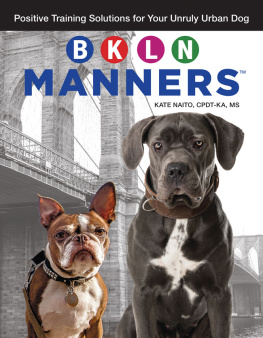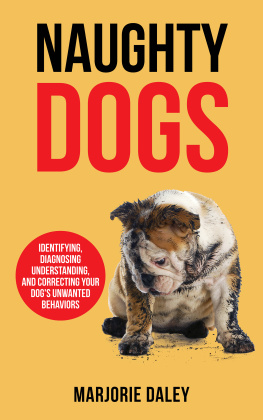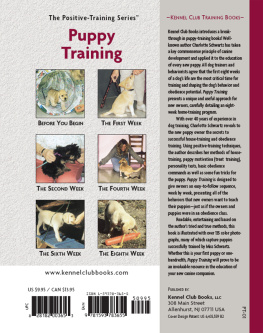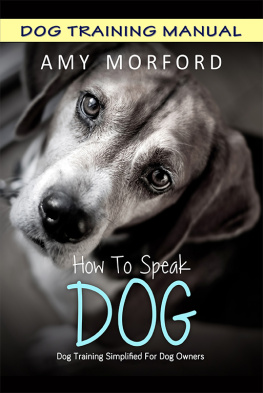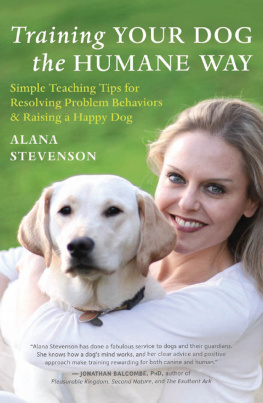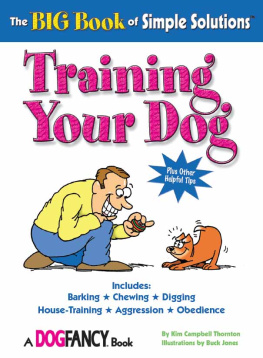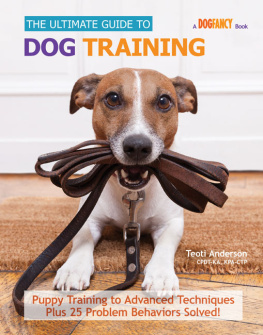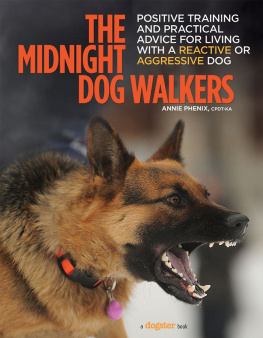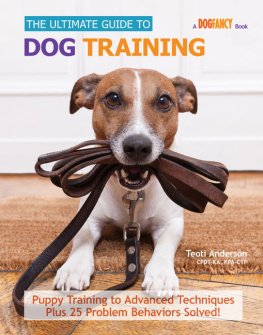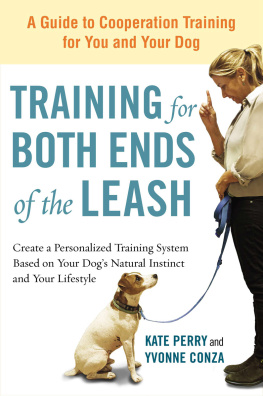Chapter 1: Think Positive
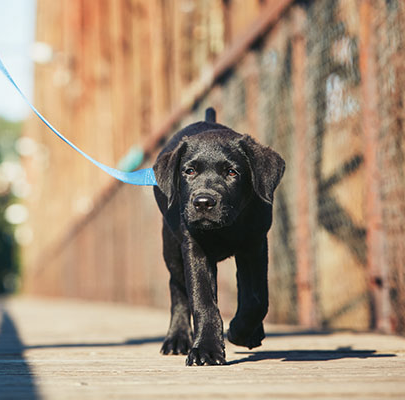
T he key to good doggie manners is preventing bad ones rather than doing damage control once the dog has already made a mistake. With every jump on a horrified houseguest, your dog will be reminded how much fun it is to jump on people, especially whenoh, goodie!they squeal and thrash like squeaky toys. The habit becomes increasingly difficult to break because it is inherently enjoyable for your dog. Instead of struggling to calm down a dog who is already jumping wildly, prevent this habit from starting. If you know guests will be arriving at 4:00 p.m., get your dog happily in his crate or confined to your bedroom with a treat-stuffed toy by 3:55. Dont wait for the doorbell to ring and his doggie brain to explode.
As I mentioned in the Introduction, dog training actually has little to do with your dog. It has everything to do with how you react to your dogs behavior. My clients at Doggie Academy often assume that my own dogs are perfectly behaved at all times, as if theyre finely tuned robots just awaiting my instructions. These owners sometimes gasp when I reveal, No, no, trainers dogs misbehave all the time! Go to any obedience competition or other dog sport, which is full of professional trainers, and you will see dogs with behavior issues such as reactivity to other dogs, excessive barking, and overexcitement. Trainers simply know how to nip those issues in the bud. For example, in the case of excitement barking, a trainer will be in tune to her dogs emotions, able to pick up on the dogs subtle signs of excitement that come before the barking starts, and thus able to prevent the barking before it happens. If the dog has already barked, a trainer will immediately address it by asking the dog to perform a calm behavior to change his focus, thereby stopping the barking without force. You will never see a good trainer let a dog get completely out of control and only then try to correct the behavior. By following the steps in this book, you can channel your inner dog trainer to help your dog engage in polite, rather than rude, behaviors.
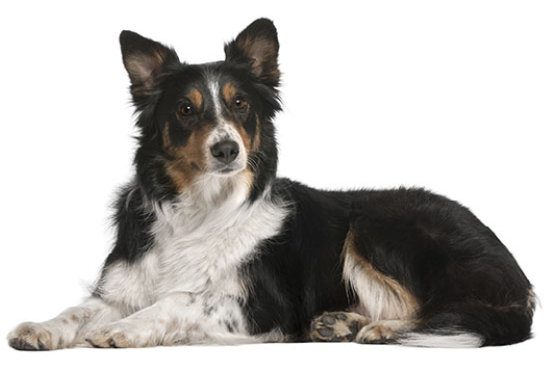
When following any given training strategy in this book, there will be several steps. Follow each step in order, and resist the temptation to skip steps. Often when dogs dont behave as wed like, its because weve pushed ahead too quickly and theyre confused about what were asking them. When training, you and your dog are learning a language together, so its vital to take baby steps forward and make sure youre communicating clearly at each step. If youve ever taken a language class in school, you know what happens if you skip a few lessons and then try to catch up. Youre totally lost, and now your instructor is speaking indecipherable gibberish reminiscent of the adults in Peanuts cartoons. At this point, youre so stressed and confused that learning the language is pretty much impossible. As you train your dog, think of yourself as a language teacher who ensures that the student fully understands Lesson 1 before proceeding to Lesson 2. Go step by step with your training, and if your dog struggles at any point, revisit the previous step as outlined in the instructions.
To Treat or Not To Treat?
Most of us dont work for free. Because we know our company will pay us, we do all kinds of things we wouldnt otherwise do: wake up before sunrise, smile at coworkers before weve had our coffee, wear a uniform, and the list goes on. If we knew our company wouldnt pay us for our efforts, Im sure most of us would quitor at least slack off. So why is it that we think our dogs should work for free? For dogs, rewards, such as treats, are payment for a job well done, and youre the boss who has the ability to dish out those rewards. So be a good boss and pay your dog well, especially for difficult tasks like sitting when hed much rather be jumping. This is the philosophy behind positive training, the form of training that I advocate because it is backed by extensive scientific research and has been proven to improve your dogs behavior in a way that is enjoyable for both of you.
Ask yourself, What motivates my dog? For most dogs, tiny pieces of training treats (including bits of real food, like chicken, hot dog, or cheese) are highly motivating and easy to dispense. It is true that some dogs will gladly work for the reward of a Good boy and a pat on the headand thats great! But if your dog doesnt fall into that category, be prepared to pay him in a currency that motivates him.
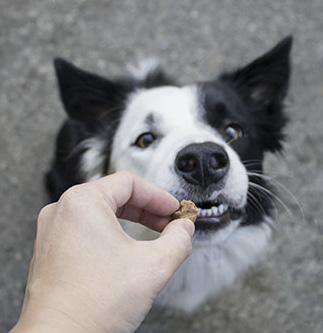
At the early stages of training, rewards accelerate the learning process because the dog gets excited to train with you and thinks, Last time I put my rear on the ground, I got a cookie. Im going to try that again! The harder the task, the better your reward should be. There are generally two scenarios that make a task hard for the dog:
- You are teaching him to do a new behavior. This could be something entirely new, like teaching him to lie down for the first time, or it could be a more difficult level of a behavior he already knows, such as a Stay for ten seconds when youve only practiced five-second Stays before. Your dog is working really hard here, and a super-tasty reward (or high-value reward, as trainers call it) will keep him in the game.
- You are asking him to do something in a new or distracting environment. Asking your dog to sit in your living room is one thing; asking him to sit at a crosswalk in Times Square is another. When your dog is in a new, stressful, or distracting place, be ready to reward him handsomely for listening to you.
Its easy for dog owners to underestimate how hard their dogs are working to be polite, especially when being asked not to jump, not to bark, or not to pull on the leash. Granted, it doesnt look terribly impressive when a dog is sitting politely at a crosswalk, but think of it from the dogs perspective: he is surrounded by interesting smells, tasty-looking food wrappers, noisy vehicles, and other dogs and people. Asking him to sit in that situation is asking him simultaneously to not do about ten other things that hed rather be doing, and thats very hard work. Therefore, in the early stages of training, the reward needs to be sufficiently motivating to keep him in the game with you.
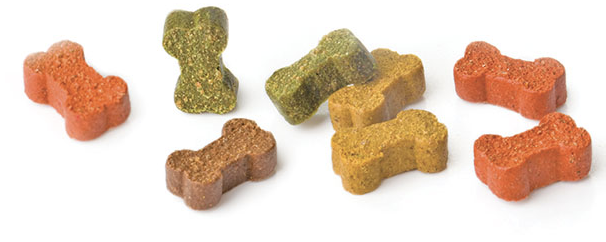
I regularly see clients who believe that their dogs are not interested in treats, and while this is occasionally true, most of the time its that the owners are asking their dogs to do something very difficult (such as sit in the presence of distractions) but not paying them adequately for it. When I teach a dog how to do a Sit-Stay indoors, I generally use a low-value treat, like kibble. When I teach the same dog the same Sit-Stay at a crosswalk, I upgrade to hot dogs because Im asking the dog to pay attention to me and ignore all the excitement around him, which is no small task. Once the dog has gained more impulse control and can more easily do the Sit-Stay at the crosswalk, I can reduce the frequency and tastiness of my rewards.
Occasionally, your dog deserves a jackpota series of several treats in a row to reward a really great response or the completion of a difficult behavior. While dogs dont seem to notice the difference between a large treat and a small treat, they definitely know the difference between one treat and a series of treats. Being rewarded with a jackpot is like getting an A+ on an extra-difficult exam; youre left with a glow because your hard work was well worth it, and you feel more motivated for your next task.
Next page
